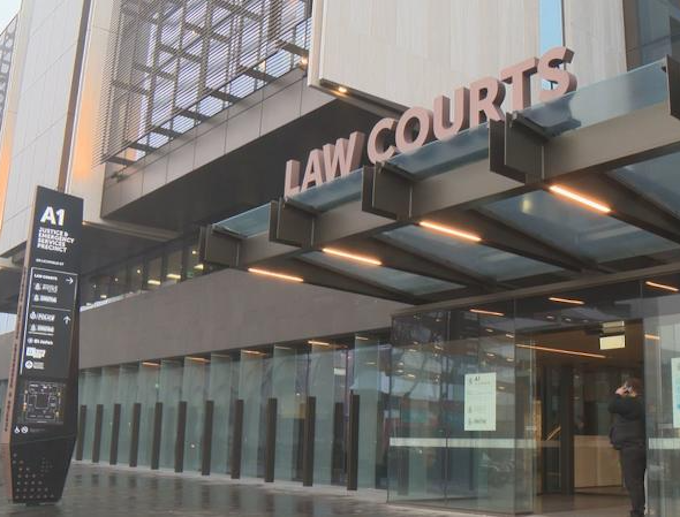
By RNZ News
The man due to go on trial for the mosque attacks in Christchurch on 15 March 2019 has today pleaded guilty to all the charges he was facing.
At the High Court in Christchurch, Brenton Tarrant admitted 51 counts of murder, 40 of attempted murder and one under the Terrorism Suppression Act.
Until today he had denied all of the charges and was scheduled to stand trial in June. The guilty plea means he has become New Zealand’s first convicted terrorist.
READ MORE: ‘They are us’: An RNZ online memorial to the lost
The 29-year-old Australian showed no emotion as he appeared via audio visual link from Auckland in the High Court at around 10am.
No explanation for Tarrant’s change of heart was given during today’s hearing. He has been remanded in custody until May.
No sentencing date has been set as the courts continue to grapple with widespread disruption from the Covid-19 pandemic.
On March 15 last year Tarrant walked into Al Noor Mosque, heavily armed, shortly after Jumu’ah – the most significant prayer of the week – began.
42 people killed in six minutes
In little over six minutes he had killed 42 people.
About 10 minutes later he arrived at the Linwood Islamic Centre and, unable to find the entrance, began shooting from outside.
He killed seven people before he was chased from the mosque’s grounds by worshipper Abdul Aziz, who picked up and threw a bank card reader at the gunman, and used one of Tarrant’s own firearms as a spear which he threw through the terrorist’s car windscreen.
A 50th victim died soon after in Christchurch Hospital, while the 51st victim passed away 48 days after the attacks.
At this morning’s hearing only a small number of people were allowed into the courtroom due to the restrictions in place in New Zealand’s Covid-19 nationwide lockdown which began today.
Those entering the courthouse were screened by security and court staff wearing protective masks.
The imams from the two mosques, Gamal Fouda and Abdul Alabi Lateef, acted as the Muslim community’s representatives and watched as Tarrant entered his pleas.
Lived in obscurity
Tarrant lived in almost total obscurity in Dunedin for almost two years before Friday, 15 March 2019.
During that time he was part of an online fraternity of white supremacist, far-right extremists.
He had few connections in the city and was essentially a loner.
His family described how his hateful ideology appeared to form as he travelled the world following his father’s death from cancer in 2010.
Tarrant travelled to the Balkans, Turkey and Pakistan, among other locations linked to the Crusades and the Islamic world, before the attack.
The murderer lived in the quiet Dunedin suburb of Andersons Bay and acquired a firearms licence and a Subaru Legacy station wagon soon after relocating to the city in 2017.
The four A-class firearms, bought using that licence, and the vehicle would be used to carry out last year’s horrific attacks.
He practised shooting at the Bruce Rifle Club near Milton in South Otago, about 50 kilometres from Dunedin, for about a year in the lead-up to the attacks.
Tarrant identified Dunedin’s Al Huda Mosque as the initial target for his attack before turning his attention to the two mosques in Christchurch and the mosque in Ashburton, where he expressed his anger at its use of a former church.
Why the appearance happened at short notice
Police Commissioner Mike Bush said arrangements for Tarrant’s appearance in court had to be made at short notice after his lawyers only indicated on Tuesday afternoon that the gunman wanted to be brought before the court.
“Police appreciate this news will come as a surprise to the victims and the public, some of whom may have wished to be present in the courtroom,” Bush said.
“The two imams from the Al Noor and Lynwood Avenue mosques were present in the courtroom as representatives of the victims, as were representatives of the media.
“Suppression orders were put in place to allow police, victim court advisors and Victim Support to advise as many of the victims as possible prior to the news being made public.”
Sentencing would not take place until it was possible for all victims who wanted to attend to be present.
“Due to the Covid-19 epidemic that will not be possible for some time,” Bush said.
“Police, victims court advisers and Victim Support will be in touch with individual victims to update them on the sentencing process, including the process for providing victim impact statements and presenting those statements at the sentencing hearing if they wish to do so.
“While the sentencing hearing is still pending, today’s guilty pleas are a significant milestone in respect of one of our darkest days.
“I want to acknowledge the victims, their families and the community of Christchurch – the many lives that were changed forever. They have inspired all of us to be a kind and more tolerant community.”
Bush also paid homage to the officers, police staff and prosecutors involved in New Zealand’s largest ever criminal prosecution.
Police would comment further after sentencing.
This article is republished by the Pacific Media Centre under a partnership agreement with RNZ.











































